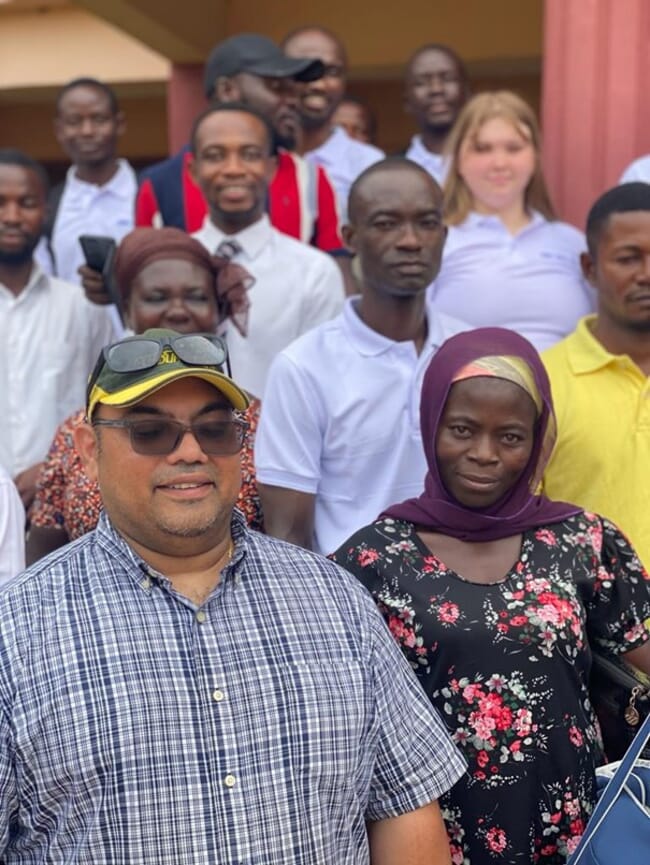
Dr Perera was deeply impressed by the speed with which the course participants assimilated and deployed the techniques that they'd learned
Over the course of two weeks, they conducted experiential learning activities at Valley View University, provided extension and outreach services to local farmers and participated in educational cultural activities.
UAPB program participants included Dr Rebecca Lochmann, professor of aquaculture and fisheries, Dr Dayan Perera, extension aquaculture specialist, and Hannah Knuckles, a graduate student of aquaculture and fisheries. They were joined by Dr Gulnihal Ozbay, DSU professor and extension specialist in natural resources, as well as DSU undergraduate students Kevin Knight and Elijah Attley, and Juan Ramos, a DSU graduate student and undergraduate alumnus of the UAPB Department of Aquaculture and Fisheries.
“This program had two overarching goals,” Dr Perera said in a press release. “First, we wanted to provide educational training in aquaculture and fisheries to students and staff at Valley View University. Secondly, we wanted to train our students to become teachers through experiential learning. This was an opportunity for them to learn how to interact with another culture and gain a global perspective that they can incorporate in their ongoing teaching, research and extension activities.”
Providing educational training
As the aquaculture industry begins to grow in Ghana, those working in the field need practical skills in water quality, fish diets and nutrition and disease diagnostics, Dr Lochmann said. She and the other program participants aimed to impart some of these skills to the Valley View University faculty and students during workshops and training sessions.
Dr Ozbay hosted workshops on measuring water quality and conducting field testing for water quality; Dr Perera worked with participants on building aquaponics systems to raise fish and vegetables simultaneously; and Dr Lochmann taught about nutrition principles and diets for fish production.
During one workshop, Dr Lochmann showed participants how they can use readily available ingredients such as fish and vegetables from the local market to prepare practical diets for tilapia production.
“We tried to keep the procedure as low-tech as possible – we were just using a meat grinder, mixer and a pellet maker,” she said. “First, we had the ingredients milled – then participants mixed the ingredients by hand to make a sort of dough, which they later turned into pellets. The participants all listened carefully and were eager to learn the correct way to make the formula. When the fish feed pellets were ready, they took pictures and couldn’t wait to feed the fish.”
Long-term progress
Dr Perera worked with Valley View University faculty and students two years ago when he conducted workshops on aquaponics. At the time, the participants were not able to produce fish because of problems with aeration and a lack of air pumps, so he showed them ways to construct simple but efficient aeration systems. When he returned to Ghana this summer to work with the same people, Dr Perera was shocked to see the progress they had made in two years.
“I was able to see the fruits of their labour immediately,” he said. “These non-traditional students have built aquaponic systems in their homes, and several have even started businesses. Some students invited me out to their farms and showed me the aquaculture systems they have built. These are people who started out with two fish in a barrel, but now have around 1,200 or 1,400 fish. The scale to which they have grown in two years truly exceeded my expectations.”
Dr Perera said the dedication of the students was so tremendous that he admits he was a bit confused during the closing ceremony of this year’s exchange program. After weeks of working with his Ghanian colleagues on constructing feed and aeration systems, he noticed that some of his most inquisitive and engaged participants were not present at the farewell dinner event.
“As it turned out, the students were at home making their own feed and aeration systems, putting into practice what they had just learned a couple hours ago,” he said. “Their enthusiasm and dedication are really inspiring to me. Some of the participants had travelled over nine hours by bus to take part in these workshops.”
“Not only did they immediately put these techniques into practice, but now they are educating others in their own communities. Several of the participants have hosted public aquaculture workshops, while others have started providing the fish they raise to local elementary schools.”




